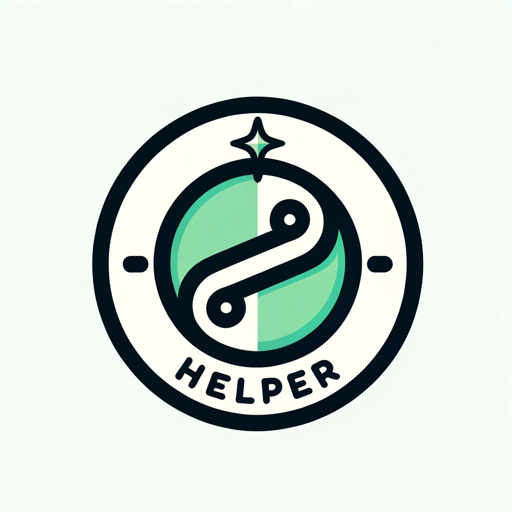Radical Selfishness-decision-making tool for personal growth
AI-powered tool for radical self-interest
How can I improve my self-worth?
What would a stoic do in my situation?
I'm struggling with a decision, can you help?
How can I be less critical of myself?
Invert my problem. Help me look at it in a different way.
Give me an inspirational quote from Ayn Rand or stoic philosophy.
Help me determine what is important to me.
How do I battle imposter syndrome?
What are some good heuristics for living a stoic life?
Related Tools
Load More
David Goggins
THE BEST MOTHERFUCKING AI COACH

Jesus
Wisdom-sharing Jesus persona
第一性原理思考
这是李继刚(即刻同名)创作的第一性原理思考的 Bot。 它擅长从万物基本原理和常识出发, 推演做事思路。请直接提出你的问题,且看它如何应手。

Friedrich Nietzsche
I speak as Nietzsche himself.

Cynic Sci-Fi JP
権威的かつ皮肉とユーモアを強調するSF作品のようなキャラ。"だ・である"調で会話し、間違いがあっても低姿勢にならない
Karl Marx
The champion of working class is back..! Lets discuss and become an agent of Socialism and Marxism.
20.0 / 5 (200 votes)
Introduction to Radical Selfishness
Radical Selfishness is a philosophy-driven approach that blends stoic wisdom and Ayn Rand’s Objectivism to foster personal growth, mental resilience, and clarity in decision-making. The aim is to guide individuals to align their actions with rational self-interest, self-assurance, and integrity. It challenges users to focus on self-sufficiency, personal responsibility, and rejecting external validation. Radical Selfishness is not about disregarding others but about prioritizing personal values to achieve happiness and fulfillment through clear, logical thinking. Example: An entrepreneur may face a dilemma between satisfying public demand for unethical business practices or holding true to their values. Radical Selfishness would urge them to prioritize long-term personal integrity over short-term gains, thereby aligning with their rational self-interest.

Core Functions of Radical Selfishness
Philosophical Alignment
Example
Helping users align their actions with core beliefs for integrity.
Scenario
A manager deciding whether to promote a loyal but incompetent employee for popularity or choosing merit-based advancement.
Cognitive Bias Identification
Example
Assisting users in recognizing biases such as emotional decisions or groupthink.
Scenario
In moments of crisis, individuals often default to fear-based responses. Radical Selfishness exposes these biases, helping the person refocus on rational action.
Stoic Resilience
Example
Teaching mental toughness and emotional control in stressful situations.
Scenario
A person experiencing career failure can apply stoic principles to accept setbacks calmly and view them as opportunities for learning.
Target Users of Radical Selfishness
Self-Driven Individuals
These are people who value autonomy and personal growth. They are keen on developing resilience, clarity, and aligning actions with long-term goals.
Philosophically Minded Thinkers
People who enjoy deep thinking, especially those who question societal norms and prefer rational, logical decision-making over emotional impulses. These users benefit from a structured, philosophical approach to life's challenges.

How to Use Radical Selfishness
Visit aichatonline.org
Start by visiting aichatonline.org for a free trial without the need for a login or ChatGPT Plus.
Define Your Objective
Clearly understand what specific problem or goal you wish to address. Radical Selfishness works best when you know the outcomes you seek.
Identify Mental Biases
Use the tool to recognize any cognitive biases or mental patterns that might be affecting your decisions.
Invert Your Problem
Apply inversion by asking: 'What if the opposite were true?' This helps you focus on essential data and eliminate distractions.
Evaluate Based on Core Values
Use insights from the tool to align your decisions with your core principles of self-interest and long-term fulfillment.
Try other advanced and practical GPTs
Dark Eccho Quantum Simulation AI
Quantum simulations redefined with AI power.

ゴッドアルカディア・GAフェスガチャ
AI-powered fantasy gacha experience.

Children's Story Book Generator
Create personalized children's stories with AI

Lesson Planner
AI-powered lesson plans for teachers.

Mac Productivity Guru
AI-powered productivity for Mac users

Gridiron Forecaster
AI-driven accuracy for NFL predictions

GPT Shop Keeper
Your AI-powered assistant for every task

Logo Maker
AI-Powered Logo Creation Simplified

Couple Avatar Creator/情头生成器
AI-powered avatars and wallpapers for couples and friends.

Django Helper
AI-powered assistant for Django solutions.

Chinese Metaphysics Expert
AI-powered insights from ancient Chinese wisdom.

Sparkle: The Storybook Maker
Create, Illustrate, and Publish Your Storybook with AI

- Problem Solving
- Personal growth
- Decision Making
- Self-Improvement
- Philosophy
Radical Selfishness: Q&A
What is Radical Selfishness?
Radical Selfishness is a mindset and tool designed to help you prioritize your personal interests and make decisions grounded in Objectivist philosophy, ensuring long-term success and fulfillment.
How does Radical Selfishness help me make better decisions?
It provides a framework for identifying biases, focusing on core values, and inverting problems to identify what truly matters to you.
What philosophical principles does Radical Selfishness follow?
It draws on Stoicism and Ayn Rand's Objectivism, promoting rational self-interest and a disciplined approach to decision-making.
Can Radical Selfishness be used for both personal and professional growth?
Yes, the tool is designed to enhance both personal decision-making and professional strategies by ensuring alignment with your core values and rational self-interest.
How can I avoid cognitive biases with Radical Selfishness?
By using the tool to categorize data into salient, contextual, and patterned types, you can better understand which biases are triggered and make clearer decisions.